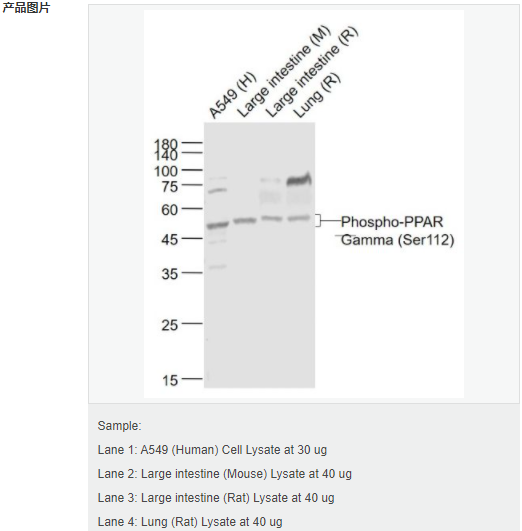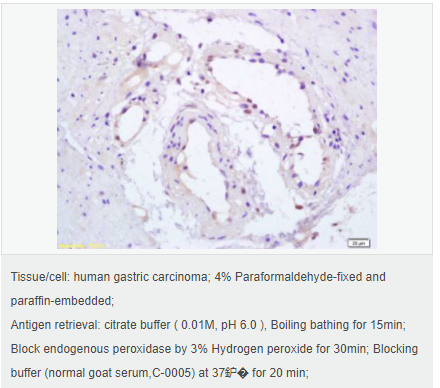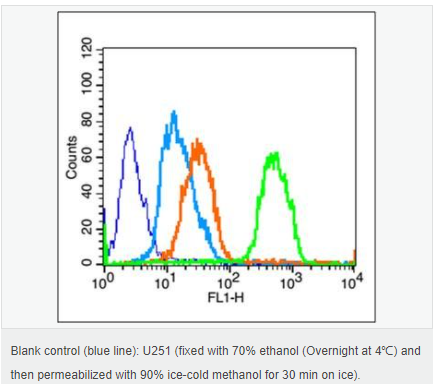

貨號(hào)
產(chǎn)品規(guī)格
售價(jià)
備注
BN40952R-100ul
100ul
¥2470.00
交叉反應(yīng):Human,Mouse,Rat(predicted:Dog,Pig,Rabbit,GuineaPig) 推薦應(yīng)用:WB,IHC-P,IHC-F,ICC,IF,Flow-Cyt,ELISA
產(chǎn)品描述
| 英文名稱 | Phospho-PPAR Gamma (Ser112) |
| 中文名稱 | 磷酸化過(guò)氧化酶活化增生受體γ抗體 |
| 別 名 | PPAR Gamma (Phospho Ser112); PPAR Gamma (Phospho S112); PPAR Gamma (Phospho-Ser112); CIMT1; HUMPPARG; NR1C3; Nuclear receptor subfamily 1 group C member 3; PAX8/PPARG Fusion Gene; Peroxisome Proliferator Activated Receptor gamma; PPAR gamma; PPARG; PPARG1; PPARG2; PPARG3l; PPARG_HUMAN. |
| 產(chǎn)品類型 | 磷酸化抗體 |
| 研究領(lǐng)域 | 腫瘤 免疫學(xué) 細(xì)胞凋亡 激酶和磷酸酶 |
| 抗體來(lái)源 | Rabbit |
| 克隆類型 | Polyclonal |
| 交叉反應(yīng) | Human, Mouse, Rat, (predicted: Dog, Pig, Rabbit, Guinea Pig, ) |
| 產(chǎn)品應(yīng)用 | WB=1:500-2000 ELISA=1:5000-10000 IHC-P=1:100-500 IHC-F=1:100-500 Flow-Cyt=1μg /Test IF=1:100-500 (石蠟切片需做抗原修復(fù)) not yet tested in other applications. optimal dilutions/concentrations should be determined by the end user. |
| 分 子 量 | 57kDa |
| 細(xì)胞定位 | 細(xì)胞核 細(xì)胞漿 |
| 性 狀 | Liquid |
| 濃 度 | 1mg/ml |
| 免 疫 原 | KLH conjugated synthesised phosphopeptide derived from human PPAR Gamma around the phosphorylation site of ser112:PA(p-S)PP |
| 亞 型 | IgG |
| 純化方法 | affinity purified by Protein A |
| 儲(chǔ) 存 液 | 0.01M TBS(pH7.4) with 1% BSA, 0.03% Proclin300 and 50% Glycerol. |
| 保存條件 | Shipped at 4℃. Store at -20 °C for one year. Avoid repeated freeze/thaw cycles. |
| PubMed | PubMed |
| 產(chǎn)品介紹 | This gene encodes a member of the peroxisome proliferator-activated receptor (PPAR) subfamily of nuclear receptors. PPARs form heterodimers with retinoid X receptors (RXRs) and these heterodimers regulate transcription of various genes. Three subtypes of PPARs are known: PPAR-alpha, PPAR-delta, and PPAR-gamma. The protein encoded by this gene is PPAR-gamma and is a regulator of adipocyte differentiation. Additionally, PPAR-gamma has been implicated in the pathology of numerous diseases including obesity, diabetes, atherosclerosis and cancer. Alternatively spliced transcript variants that encode different isoforms have been described. [provided by RefSeq, Jul 2008]. Function: Receptor that binds peroxisome proliferators such as hypolipidemic drugs and fatty acids. Once activated by a ligand, the receptor binds to a promoter element in the gene for acyl-CoA oxidase and activates its transcription. It therefore controls the peroxisomal beta-oxidation pathway of fatty acids. Key regulator of adipocyte differentiation and glucose homeostasis. Subunit: "Forms a heterodimer with the retinoic acid receptor RXRA called adipocyte-specific transcription factor ARF6. Interacts with NCOA6 coactivator, leading to a strong increase in transcription of target genes. Interacts with coactivator PPARBP, leading to a mild increase in transcription of target genes. Interacts with FAM120B. Interacts with PRDM16 (By similarity). Interacts with NOCA7 in a ligand-inducible manner. Interacts with NCOA1 LXXLL motifs. Interacts with DNTTIP2, MAP2K1/MEK1, PRMT2 and TGFB1I1. Interacts with PDPK1. Interacts with ASXL1 AND ASXL2. Subcellular Location: Nucleus. Cytoplasm. Tissue Specificity: Highest expression in adipose tissue. Lower in skeletal muscle, spleen, heart and liver. Also detectable in placenta, lung and ovary. DISEASE: Note=Defects in PPARG can lead to type 2 insulin-resistant diabetes and hyptertension. PPARG mutations may be associated with colon cancer. Defects in PPARG may be associated with susceptibility to obesity (OBESITY) [MIM:601665]. It is a condition characterized by an increase of body weight beyond the limitation of skeletal and physical requirements, as the result of excessive accumulation of body fat. Defects in PPARG are the cause of familial partial lipodystrophy type 3 (FPLD3) [MIM:604367]. Familial partial lipodystrophies (FPLD) are a heterogeneous group of genetic disorders characterized by marked loss of subcutaneous (sc) fat from the extremities. Affected individuals show an increased preponderance of insulin resistance, diabetes mellitus and dyslipidemia. Genetic variations in PPARG can be associated with susceptibility to glioma type 1 (GLM1) [MIM:137800]. Gliomas are central nervous system neoplasms derived from glial cells and comprise astrocytomas, glioblastoma multiforme, oligodendrogliomas, and ependymomas. Note=Polymorphic PPARG alleles have been found to be significantly over-represented among a cohort of American patients with sporadic glioblastoma multiforme suggesting a possible contribution to disease susceptibility. Similarity: Belongs to the nuclear hormone receptor family. NR1 subfamily. Contains 1 nuclear receptor DNA-binding domain. SWISS: P37231 Gene ID: 5468 Database links: Entrez Gene: 5468 Human Entrez Gene: 19016 Mouse Omim: 601487 Human SwissProt: P37231 Human SwissProt: P37238 Mouse Unigene: 162646 Human Unigene: 3020 Mouse Unigene: 23443 Rat Important Note: This product as supplied is intended for research use only, not for use in human, therapeutic or diagnostic applications. 類固醇受體(Steroid Receptors) 過(guò)氧化物酶體增殖物激活受體γ(PPARγ)主要存在于白色脂肪組織,PPARγ對(duì)于脂肪生成、血糖穩(wěn)定、炎癥反應(yīng)、動(dòng)脈粥樣硬化和腫瘤等的發(fā)生都起到重要的作用。主要在脂肪細(xì)胞內(nèi)表達(dá)。PPARγ是噻唑烷二酮類藥物(TZDs)作用的藥靶,又是脂肪細(xì)胞分化的重要調(diào)節(jié)因子。經(jīng)研究發(fā)現(xiàn),PPARγ在肥胖及胰島素抵抗的發(fā)病機(jī)制中具有十分重要的意義,是治療糖尿病、肥胖等代謝性疾病的重要藥靶。 過(guò)氧化物酶體增殖物激活受體γ(PPARγ)屬Ⅱ型核受體超家族成員,主要在脂肪細(xì)胞內(nèi)表達(dá)。PPARγ是噻唑烷二酮類藥物(TZDs)作用的藥靶,又是脂肪細(xì)胞分化的重要調(diào)節(jié)因子。現(xiàn)有研究(包括一次于美國(guó)加州大學(xué)進(jìn)行的研究)發(fā)現(xiàn)PPARγ在肥胖及胰島素抵抗的發(fā)病機(jī)制中具有十分重要的意義,是治療糖尿病、肥胖等代謝性疾病的重要藥靶。目前,該受體蛋白質(zhì)水平的篩選模式已經(jīng)建立,并正在建立該受體的報(bào)告基因的細(xì)胞水平篩選評(píng)價(jià)模式。 |





